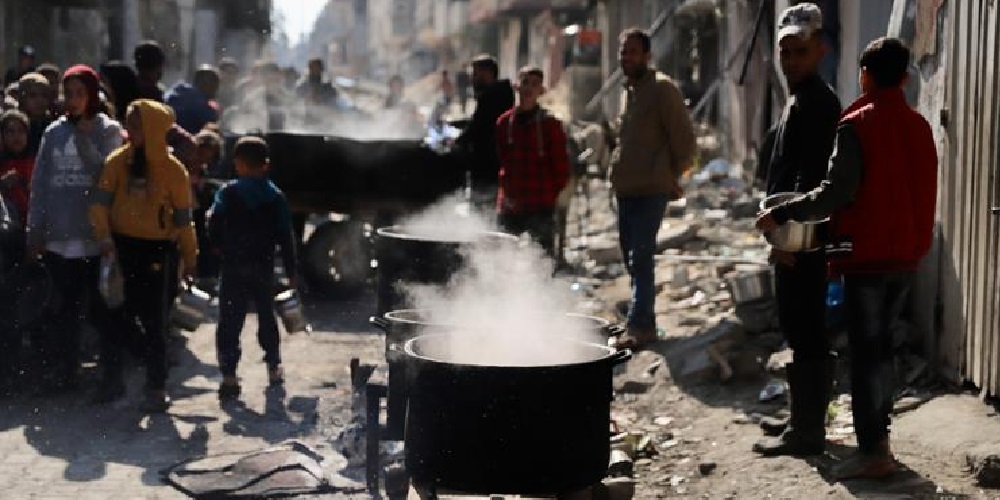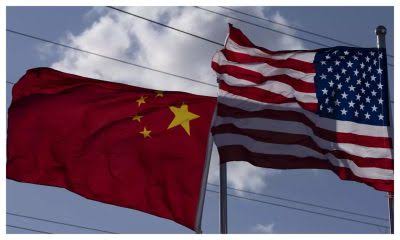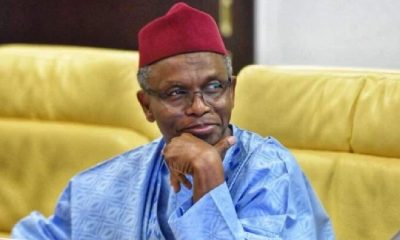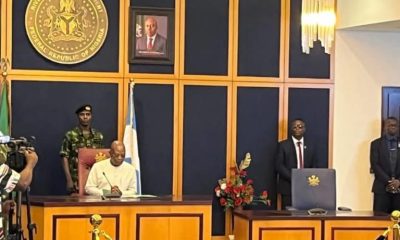Foreign
Israel Forces Fire On Gazans Rushing For Food Aid

Israeli forces in war-torn Gaza opened fire on Palestinians scrambling for food aid in a chaotic melee on Thursday that the health ministry in the Hamas-run territory said killed more than 100 people.
The Israeli military said a “stampede” occurred when thousands of desperate Gazans surrounded a convoy of 38 aid trucks, leading to dozens of deaths and injuries, including some who were run over by the lorries.
An Israeli source acknowledged troops had opened fire on the crowd, believing it “posed a threat”.
The Gaza health ministry condemned what it called a “massacre” in Gaza City in which 112 people were killed and more than 750 others wounded.
The incident adds to a Palestinian death toll from the war which the ministry earlier Thursday said had topped 30,000, and dampens hopes a truce deal between Israel and Hamas militants could be just days away.
There were conflicting reports on what exactly unfolded in the hours before dawn.
A witness in Gaza City, declining to be named for safety reasons, said violence unfolded when thousands of people rushed towards aid trucks at the city’s western Nabulsi roundabout, and soldiers fired at the crowd “as people came too close” to tanks.
Israeli army spokesman Daniel Hagari said the military had fired “a few warning shots” to try to disperse a crowd that had ambushed the aid trucks.
When the crowd got too big, he said the convoy tried to retreat and “the unfortunate incident resulted in dozens of Gazans killed and injured”.
Aerial images released by the Israeli army showed what it said were scores of Gazans surrounding aid trucks in Gaza City.
Ali Awad Ashqir, who said he had gone to get some food for his starving family, told AFP he had been waiting for two hours when trucks began to arrive.
“The moment they arrived, the occupation army fired artillery shells and guns,” he said.
The army spokesman Hagari later denied Israeli forces carried out any shelling or strikes at the time.
‘Another day from hell’
US President Joe Biden said Washington was checking “two competing versions” of the incident, while a State Department spokesman said the United States had been in touch with Israel and was “pressing for answers” on what happened.
The shooting incident would complicate efforts to broker a truce, Biden said, later admitting that any deal was unlikely to happen by Monday — the timeline that he had predicted earlier this week.
The US president spoke with Qatari and Egyptian leaders in separate phone calls, the White House said, saying he discussed both the ceasefire and the “tragic and alarming” aid incident.
The UN Security Council will hold a closed-door emergency meeting on the incident on Thursday afternoon.
Saudi Arabia strongly condemned what it called the “targeting” of unarmed civilians, while Kuwait and the UAE also issued condemnations.
Qatar warned that Israel’s “disregard for Palestinian blood… (will) pave the way for an expanding cycle of violence”.
Italy called for an immediate ceasefire in Gaza to facilitate more humanitarian aid.
Looting of aid trucks has previously occurred in northern Gaza, where desperate residents have taken to eating animal fodder and even leaves to try to stave off starvation, as aid groups warn of looming famine after nearly five months of war.
The chief of the United Nations agency for Palestinian refugees, UNRWA, said that no UN agency had been involved in Thursday’s aid delivery, and called it “another day from hell”.
Truce hopes
The war began on October 7 with an unprecedented Hamas attack on southern Israel that resulted in the deaths of around 1,160 people, mostly civilians, Israeli figures show.
Militants also took about 250 hostages, 130 of whom remain in Gaza, including 31 Israel says are presumed dead.
Israel’s retaliatory military campaign has killed 30,035 people, according to the Hamas-run Gaza’s health ministry.
Israel’s military says 242 soldiers have died in Gaza since ground operations began in late October.
Washington, a key ally of Israel, has been pushing for a reduction in civilian casualties and a ceasefire.
It has been working with mediators from Egypt and Qatar to seek a six-week pause in the war.
Negotiators had hoped a truce could begin by around March 10 or 11 when the Muslim holy month of Ramadan begins, depending on the lunar calendar.
The proposals reportedly include the release of some Israeli hostages held in Gaza by militants in exchange for hundreds of Palestinians held in Israeli prisons.
Short of the complete withdrawal Hamas has called for, a source from the group said the deal might see Israeli forces leave “cities and populated areas”, allowing the return of some displaced Palestinians and humanitarian relief.
Fears of famine
The World Food Programme has said Israel has blocked access for aid deliveries — which Israeli officials have denied — and warned that if nothing changes, “a famine is imminent in northern Gaza”.
As fighting continued in Gaza, Muhammad Yassin, 35, battled to find flour in Zeitun.
“We have not eaten a loaf of bread for two months,” he said. “Our children are starving.”
In the south, nearly 1.5 million people trying to flee the fighting are now packed into Rafah city, also short of food, as Israel threatens to send in troops against Hamas fighters.
Israeli Prime Minister Benjamin Netanyahu has come under increasing pressure to bring the remaining hostages home.
A group of 150 Israelis have started a four-day march from Reim, near the Gaza border, to Jerusalem, calling for the government to reach a deal.
Violence has also surged in the occupied West Bank, where two Israelis were killed on Thursday.
AFP
Foreign
Trump urges Russia to ‘get moving’ on Ukraine as Witkoff meets Putin

US envoy Steve Witkoff wrapped up his latest talks with Russia’s Vladimir Putin on Friday, after President Donald Trump urged his Russian counterpart to move quicker to end what he said was the country’s “senseless war” with Ukraine.
Trump has been pressing Moscow and Kyiv to agree on a ceasefire deal but has failed to extract any major concessions from the Kremlin, despite repeated negotiations between Russian and US officials.
The US leader told NBC News last month he was “pissed off” with his Russian counterpart, while top US diplomat Marco Rubio warned last week that Washington would not tolerate “endless negotiations” with Russia over the conflict.
“Russia has to get moving,” Trump wrote on his Truth Social platform, adding that the conflict, which began in February 2022 when Moscow sent troops into Ukraine, was “senseless” and “should have never happened”.
Kyiv and several of its Western allies suspect Russia of stalling the talks on purpose.
Ukraine’s President Volodymyr Zelensky has accused Russia of dragging Beijing into the conflict and on Friday claimed that hundreds of Chinese nationals were fighting at the Ukraine front line alongside Russian troops.
Trump’s post came just before Witkoff’s meeting with Putin at the presidential library in Saint Petersburg, which state news agencies said lasted four and a half hours.
The Kremlin said afterwards only that the meeting had taken place and “focused on various aspects of the Ukrainian settlement”, without elaborating.
Spokesman Dmitry Peskov had said earlier that he expected no diplomatic “breakthroughs” from the talks — Witkoff’s third with Putin since February.
He also said “maybe” to a question about whether a possible meeting between Putin and Trump would be discussed.
– Kellogg’s ‘zones of responsibility’ –
After their last meeting, Witkoff — a long-time Trump ally who worked with the US president in real estate — said Putin was a “great leader” and “not a bad guy”.
The envoy’s praise of a president long seen by the United States as an autocratic adversary highlights the dramatic turn in Washington’s approach to dealings with the Kremlin since Trump took office for a second term.
Despite a flurry of diplomacy, there has been little meaningful progress on Trump’s main aim of achieving a ceasefire.
Keith Kellogg, Trump’s special envoy to Ukraine, suggested British and French troops could adopt zones of control in the country, in an interview with The Times published Saturday.
Kellogg suggested they could have areas of responsibility west of the Dnipro river, as part of a “reassurance force”, with a demilitarised zone separating them from Russian-occupied areas in the east.
“You could almost make it look like what happened with Berlin after World War II,” he told the British newspaper.
“I was speaking of a post-ceasefire resiliency force in support of Ukraine’s sovereignty. In discussions of partitioning, I was referencing areas or zones of responsibility for an allied force (without US troops),” he said later on X.
– ‘Using Chinese lives’ –
Kyiv said this week that its forces had captured two Chinese nationals in the eastern Donetsk region fighting for Moscow.
The Kremlin denied the claim, while Beijing warned parties to the conflict against making “irresponsible remarks”.
“As of now, we have information that at least several hundred Chinese nationals are fighting as part of Russia’s occupation forces,” Zelensky told military chiefs from allied countries in Brussels.
“This means Russia is clearly trying to prolong the war — even by using Chinese lives.”
The Ukrainian leader also called out Russia for having refused a complete ceasefire proposed by the United States with Ukrainian approval a month ago.
Putin last month rejected a full and unconditional pause in the conflict, while the Kremlin has made a truce in the Black Sea conditional on the West lifting certain sanctions.
– Question of trust –
Trump has pushed for a broad rapprochement with Moscow, which has yielded some results.
On Thursday, Russia freed dual US-Russian ballet dancer Ksenia Karelina from prison in exchange for suspected tech smuggler Arthur Petrov, the second exchange between Moscow and Washington in less than two months.
Karelina, arrested last January while visiting Russia to see family, was serving a 12-year sentence on “treason” charges after she donated the equivalent of around $50 to a pro-Ukraine charity.
The head of Moscow’s foreign intelligence service, Sergei Naryshkin, said Friday that Russia would discuss more prisoner swaps in the future.
Russian Foreign Minister Sergei Lavrov said the swaps helped build confidence between the two sides, which deteriorated under former US president Joe Biden’s administration.
“It helps build trust, which is much needed, but it will take a long time to finally restore it,” he told reporters.
AFP
Foreign
FG, stakeholders commend EU over disability rights funds

*Decry USAID funding cut
By Francesca Hangeior
The Federal Government and stakeholders, has applauded the European Union for funding a project aimed at advocating the rights of Persons with Disability in the wake of the halt in funding by the United States Agency for International Development.
They gave the tributes at the official launch of the Disability Rights Advocacy Project for Inclusive Development, a three-year initiative co-funded by the EU in collaboration with the Christian Blind Mission held in Abuja.
The Executive Secretary of the National Commission for Persons with Disabilities, Ayuba Burki, described the project as a welcome development.
He said, “This project is very commendable. As it is a three-year project, it is our desire that this will go as planned for all persons with disability to be involved. Disability programmes are not exclusively the purview of some persons in organisations.
“It means all hands must be on deck, and we must achieve our set goals. So I am delighted and look forward to a successful implementation of this programme in the next three years. We call on other partners to follow suit so that at the end of the day, people living with disabilities can heave a sigh of relief.”
Burki also rued the funding cut of USAID by United States President Donald Trump, saying it will put pressure on many third-world countries.
He also sees it as an opportunity for leaders in the affected countries to look inward and find solutions.
“I will call on African leaders to take up this challenge and look inward. I believe that USAIÐ was doing a great job. But we cannot abandon caring for our people because it pulled out. We need to look inward and re-strategise.
“Who knows? This may be a blessing in disguise. So I don’t see a cause to worry. But it is an opportunity to look inward and solve funding and reprioritise our priorities as a nation. We will be fine at the end of the day,” he stated.
The Founder of The Albino Foundation, Chief Jack Epelle also shared his sentiments.
Epelle warned that Nigeria and many other developing nations cannot continue to depend on USAID funding forever.
He said, “I think it’s a good and bad omen. It is a good omen because it is high time we begin to take our eyes off development funding and begin to develop ourselves so that we, in turn, can fund others. This kind of event should propel us to look inward and begin to see how to meet the needs of the people by ourselves.
“The bad omen is that there are projects USAID has started and individuals were employed. Some projects were expected to run for three to five years. It will create hardships. Several children will be out of school, and many families not sure of where their next meal will come will suffer.”
He, however, praised the European Union for agreeing to undertake the advocacy of persons with disabilities, especially at the grassroots.
Earlier in his address, the CBM Global Head of Programme Implementation, Bright Ekweremadu, said the project couldn’t have come at a better time.
Ekweremadu also hailed the EU for taking up the bold initiative to continue funding humanitarian projects at a time when President Donald Trump halted USAID funding in Africa and other regions.
He said, “We all know what recently happened to USAID. So when you see a global donor or funder for programmes like this, we need to prostrate and think of them for coming to the aid of the less privileged and vulnerable in society.
“Today is a bold declaration of purpose in a shared commitment to a future where every Nigerian, regardless of their ability, has a right to dignity, opportunity and full participation in the society.
“It is our collective response to the persistent inequalities that persons with disabilities face every single day of their lives, sometimes consciously from us. Together, let us build a Nigeria where disability will be recognised, every voice will be heard, and no one is left behind.”
While appreciating the gesture from the audience, the head of the European Union delegation, Wynyfred Egbuson, emphasised the need to advocate for the cause of the less privileged in society.
According to her, the EU-CBM project was signed after a conscious and rigorous exercise of assessing its possible impact.
She said, “Today’s event is an outcome of the long process that started in June 2024 with a call for proposals by civil society organisations and human rights organisations within and outside Nigeria through a competitive and rigorous process that entails three stages of assessment.
“The CBM and its co-implementing partners were selected from 31 applications, leading to the project being launched today. It is estimated that over 25 million people live with disability in Nigeria. This translates to one in every 10 Nigerians.
“Unfortunately, persons with disability are among the most vulnerable members of our society. They face social stigma, exploitation, discrimination and exclusion from participating in the society. We believe that a lot still needs to be done.”
Foreign
China retarliates with 84% tarrifs on US products from 12midnight

China will impose 84 percent tariffs on US imports, up from 34 percent, the finance ministry said Wednesday, hours after similar levies by the United States came into force.
US President Donald Trump’s latest salvo of tariffs came into effect on dozens of trading partners Wednesday, including punishing 104 percent duties on imports of Chinese products.
Beijing has consistently opposed tariff rises and said Wednesday it would take “firm and forceful” steps to protect its interests.
Its finance ministry later said in a statement that “additional tariff rates” on imports originating in the United States would “rise from 34 percent to 84 percent”, effective from 12:01 pm on Thursday.
“The tariff escalation against China by the United States simply piles mistakes on top of mistakes (and) severely infringes on China’s legitimate rights and interests,” the ministry said.
Washington’s moves “severely damage the multilateral rules-based trade system”, it added.
In a separate statement, Beijing’s commerce ministry said it would blacklist six American artificial intelligence firms, including Shield AI Inc. and Sierra Nevada Corp.
The companies had either sold arms to Taiwan or collaborated on “military technology” with the island, the commerce ministry said.
-

 News10 hours ago
News10 hours agoWe only had lunch with Buhari not 2027 politics -El-Rufai
-

 News23 hours ago
News23 hours agoFCT minister, Wike gives land allotees 21 days to pay or lose offer
-

 News10 hours ago
News10 hours agoSad! Explosion rocks Lagos
-

 News10 hours ago
News10 hours agoParts of Abuja, Niger in total darkness -AEDC confirms
-

 News9 hours ago
News9 hours agoIbas gives reasons why Sole Administrators were appointed for Rivers councils
-

 News8 hours ago
News8 hours agoUS embassy announces new requirements for visa interviews for Nigerian applicants
-

 News8 hours ago
News8 hours agoFive countries with easy work visas in 2025
-

 News5 hours ago
News5 hours agoOERAF Rounds Up Late Chief Ekuogbe Rowland Akpodiete’s remembrance with Novelty Match





